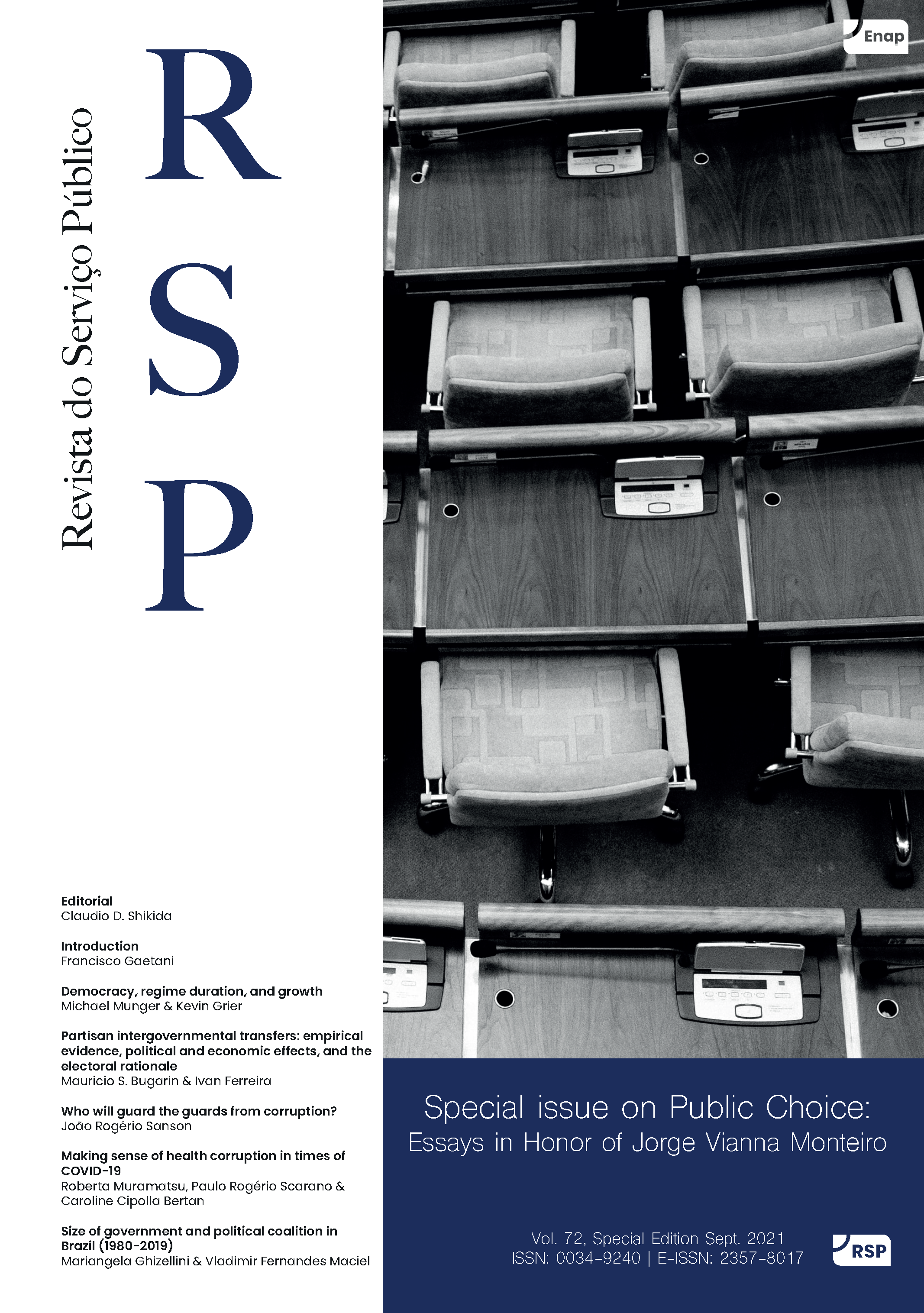Size of government and political coalition in Brazil (1980-2019)
Keywords:
coalition presidentialism, political fragmentation, size of government, BrazilAbstract
This paper seeks to understand the political and institutional determinants of the size of the federal government in Brazil between 1980 and 2019. The hypotheses here evaluated are: (i) the greater the fragmentation in the National Congress, the greater the size of the government coalition; (ii) the larger the government coalition, the greater the number of ministries and secretariats responsible for spending; (iii) the greater the number of ministries and secretariats, the greater the federal government's expenditure expense and, therefore, the greater its size; (iv) the 1988 Constitution also increased expenses and the size of the federal government. Although the results are limited by the length of the time series, there are elements that underscore the importance of analyzing the public budget and the size of the government through the lens of Public Choice. The country's fiscal problems are not restricted to management issues or the need to curb fraud and corruption. They have a relevant political-institutional component. Not considering these aspects makes discussions about administrative and tax reforms sterile.
Downloads
References
ABRANCHES, Sérgio Henrique Hudson. Presidencialismo de coalizão: o dilema institucional brasileiro. Revista de Ciências Sociais, Vol. 31, n. 1, p. 5-34. Rio de Janeiro, 1988.
AMORIM NETO, Octavio; BORSANI, Hugo. Presidents and Cabinets: The political determinants of Fiscal Behavior in Latin America. Studies in Comparative International Development, vol. 39, n. 1, 39, p. 3-27. 2004.
AMORIM NETO, Octavio. Presidencialismo e Governabilidade nas Américas. Rio de Janeiro: Editora FGV, 2006.
BASSI, CM Receitas vinculadas e despesas obrigatórias: explorando conceitos, métodos de atuação e determinantes à rigidez orçamentária. Brasília: IPEA, ago. 2019. (Nota Técnica Disoc, n. 56).
BATISTA, Mariana. A Conexão Ministerial: governo de coalizão e viés partidário na alocação de emendas parlamentares ao orçamento (2004-2010). Revista Ibero-Americana de Estudos Legislativos, [Sl], v. 4, n. 1, mai. 2015. ISSN 2179-8419. Available in <http://bibliotecadigital.fgv.br/ojs/index.php/riel/article/view/49202>. Accessed on Feb. 10th, 2020.
BATISTA, Mariana. O Poder no Executivo: explicações no presidencialismo de coalizão. Revista de Sociologia Política, v. 24, n. 57, p. 127-155. Curitiba, 2016.
BAWN, Kathleen e ROSENBLUTH, Frances. Short versus Long Coalitions: Electoral Accountability and the Size of the Public Sector. American Journal of Political Science: Midwest Political Science Association, v. 50, n. 2. p. 251-265. 2006.
BRASIL. TESOURO NACIONAL. Despesas da União: séries históricas. Brasília. Available in <https://www.tesourotransparente.gov.br/publicacoes/despesas-da-uniao-series-historicas/2019/11> Accessed on July 6th, 2020.
CINTRA, Marcos. Ajuste fiscal e disputa orçamentária. Rio de Janeiro: FGV, Revista Conjuntura Econômica, v. 72, n. 2, p. 28-29, 2018.
COOPEDGE, M. A Classification of Latin American Political Parties. Kellogg Institute. Working Paper, 244, 1997.
DAL-RI, Fabiano; CORREIA, Fernando Motta. Ciclos político-eleitorais e alocação dos gastos públicos: uma análise para os municípios brasileiros. Revista De Economia da Universidade Federal do Paraná, v. 40, n. 73, p. 305-322, 2019. Available in
<https://revistas.ufpr.br/economia/article/view/68176/39764> Accessed on Nov. 28th, 2020.
FIGUEIREDO, Argelina Cheibub. Executivo e Legislativo na nova ordem constitucional. Editora FGV. 2. ed. Rio de Janeiro, 2001.
FREITAS, Andréa. O presidencialismo da coalizão. Fundação Konrad Adenauer. Rio de Janeiro, 2016.
GIACOMONI, James. Receitas vinculadas, despesas obrigatórias e rigidez orçamentária. Orçamentos Públicos e Direito Financeiro. 1ª Ed. São Paulo: Revista dos Tribunais, 2011.
LAAKSO, MARKKU; TAAGEPERA, REIN. The "Effective" Number of Parties: "A Measure with Application to West Europe" Comparative Political Studies; 12, 1; ProQuest, p. 3-27, 1979.
LIMONGI, Fernando; FIGUEIREDO, Argelina. Bases institucionais do presidencialismo de coalizão. Lua Nova, n. 44, p. 81-106. São Paulo, 1998.
LISBOA, Marcos de Barros; LATIF, Zeina Abdel. Democracy and growth in Brazil. INSPER Working Papers. 2013. Available in <http://www.insper.edu.br/working-papers/working-papers-2013/democracy-and-growth-in-brazil/> Accessed on Nov. 27th, 2020.
MACIEL, Vladimir Fernandes; ARVATE, Paulo Roberto. Tamanho do governo brasileiro: conceitos e medidas. Revista de Administração Contemporânea, v. 14, n. 1, p. 1-19, Fev. Curitiba, 2010.
MACIEL, VF; GAMBOA; U, MR; GHIZELLINI, M. The Importance of State-Owned Enterprises: Political Fragmentation and Size of Government in Brazil (1985-2016). São Paulo: Centro Mackenzie de Liberdade Econômica, Anais do IV Fórum Mackenzie de Liberdade Econômica, p. 686-703, 2020.
MELLO, Eduardo; SPEKTOR, Matias. Brazil: The Costs of Multiparty Presidentialism. Journal of Democracy, v. 29, n.2, p. 113-127. Abr. 2018.
MONTEIRO, Jorge Vianna. Economia do Setor Público. 1a.. ed. Rio de Janeiro: IPEA, 1987. 166p.
MONTEIRO, Jorge Vianna. Macroeconomia do Crescimento do Governo. 1a.. ed. Rio de Janeiro: IPEA, 1990.
MONTEIRO, Jorge Vianna. “O Ambiente Institucional-constitucional da Política de Gasto Público e das Escolhas Orçamentárias em Geral” In: REZENDE, Fernando; CUNHA, Armando. A reforma esquecida: orçamento, gestão pública e desenvolvimento. Rio de Janeiro: FGV, 2013, p. 265-325.
MONTEIRO, Jorge Vianna. Elementos da conexão eleitoral. Revista de Administração Pública [online], v. 44, n. 2, pp. 533-544, 2010. Available in <https://doi.org/10.1590/S0034-76122010000200015>.
NICOLAU, Jairo Marconi. Dados eleitorais do Brasil. Textos e dados sobre política. Available in <https://jaironicolau.github.io/deb/> Accessed on June 11th, 2020.
NICOLAU, Jairo Marconi. Dados eleitorais do Brasil, 1982-1996. Editora Revan. Rio de Janeiro, 1998.
NICOLAU, Jairo. Sistemas eleitorais. Editora FGV. Rio de Janeiro, 2015.
PERSSON, Torsten; TABELLINI, Guido, The size and scope of government: Comparative politics with rational politicians. European Economic Review, Elsevier, v. 43, p. 699-735, 1999.
TAVARES, José. Does right or left matter? Cabinets, credibility and fiscal adjustments. Journal of Public Economics, v. 88, n. 12, p. 2447-2468, 2004.
TSEBELIS, George. Veto Players: How Political Institutions Work. Princeton University Press. Princeton, 2002.
VOLKERINK, Bjørn; HAAN, Jacob de. Fragmented government effects on fiscal policy: new evidence. Public Choice, v.109, p. 221-242. 2001.
VON HAGEN, Jürgen. Fiscal Rules, Fiscal Institutions, and Fiscal Performance. The Economic and Social Review, v. 33, n. 3, Winter, p. 263-284. Centre for European Integration Studies. Bonn, 2002.
Downloads
Published
How to Cite
Issue
Section
License
Copyright (c) 2021 Revista do Serviço Público

This work is licensed under a Creative Commons Attribution-NonCommercial-ShareAlike 4.0 International License.
- A RSP adota a licença Creative Commons (CC) do tipo Atribuição – Uso Não-Comercial (BY-NC).
- A licença permite que outros remixem, adaptem e criem obra licenciada, sendo proibido o uso com fins comerciais.
- As novas obras devem fazer referência ao autor nos créditos e não podem ser usadas com fins comerciais, porém não precisam ser licenciadas sob os mesmos termos dessa licença.
- Ao publicar o artigo na RSP, o autor cede e transfere para a ENAP os direitos autorais patrimoniais referentes ao artigo.
- O artigo publicado na RSP não poderá ser divulgado em outro meio sem a devida referência à publicação de origem.
- O autor que tiver o artigo publicado na RSP deverá assinar o Termo de Concessão de Direitos Autorais (em momento oportuno a editoria da Revista entrará em contato com o autor para assinatura do Termo).



